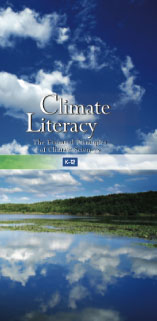Scientists and educators at COSEE-OS workshops have developed concept maps to improve their collective understanding of Earth's major ocean-climate systems. Maps relating to climate literacy are available for download (PDF format) or use in the COSEE-OS Concept Map Builder in the menu at left. Click here for ocean literacy maps.
Climate Literacy
Climate Literacy is an understanding of the climate's influence on you and society and your influence on climate.
A climate-literate person:
- Understands the essential principles of all aspects of the Earth system governing climate patterns that are presented in this document;
- Knows how to gather information about climate and weather, and how to distinguish credible from non-credible scientific sources on the subject;
- Communicates about climate and climate change in a meaningful way; and
- Makes scientifically informed and responsible decisions regarding climate.
The Climate Literacy Framework was developed through a consensus building process. Various members of both the US science and education communities worked to define the fundamental concepts related to climate. A grant from the US National Oceanic and Atmospheric Administration (NOAA) funded a workshop and subsequent efforts that brought together numerous scientists from NOAA, other federal science agencies, formal and informal educators, non-governmental organizations, and other institutions involved in climate research, education, and outreach. These representatives worked to create the Climate Literacy Framework by building on climate research and the science and technology benchmarks developed by the American Association for the Advancement of Science (AAAS) Project 2061.
The Essential Principles and Fundamental Concepts outlined in this brochure (PDF, 4.77 MB) represent ideas that do not fall neatly within a particular discipline. As a result, many Fundamental Concepts illustrate more than one Essential Principle. For example, Essential Principle 1 covers concepts that reoccur in other Essential Principles. This is unavoidable and demonstrates the interdisciplinary nature of climate science and informed decision making.
|






